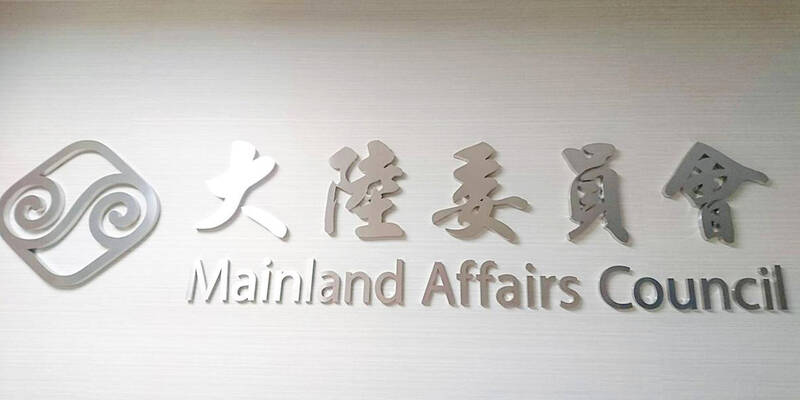Beijing is touting 12 financial measures to attract Taiwanese investment as benefiting Taiwan, but they are actually aimed at bolstering China’s sluggish economy, the Mainland Affairs Council (MAC) said.
The measures, announced by the People’s Bank of China and the State Administration of Foreign Exchange, are designed to support the Chinese Communist Party’s (CCP) Central Committee’s and the Chinese State Council’s goal of promoting China’s Fujian Province as a cross-strait integrated development demonstration area, the bank said.
They include pushing for more Taiwanese-funded enterprises in Fujian to be listed on a Chinese stock exchange, and allowing Fujian banks to provide cross-border yuan collection and payment services for Taiwanese who purchase real estate in the province.

Photo: Chung Li-hua, Taipei Times
The MAC said that China is facing an economic downturn and deepening deflation, adding that its real-estate market is in recession, investment environment is deteriorating, and many residential and commercial buildings are idle.
Although the CCP says that China’s unilateral measures would benefit Taiwan, the initiatives are only to help China deal with a crashing real-estate market and lift its sluggish economy, it said.
Most of the new measures already exist or are just improvements to current measures, MAC said.
The benefits of China’s cross-strait integration measures to Taiwanese and Taiwanese enterprises are limited, it said.
The efforts are a part of the CCP’s “united front” activities, it said, adding that people should be aware of the risks before participating in the program.
The measures focus on four areas, the first three of which are improving the cross-strait financial environment and providing services to help Taiwanese-funded enterprises develop in China; supporting high standards for cross-border trade in Fuzhou, Xiamen and Quanzhou; and enhancing financial regulation, and preventing and resolving financial risks, China’s central bank said.
The fourth is “supporting the convenience of capital account transactions and financing,” which aims to bolster and improve the Straits Equity Trading Center’s Taiwan funding division, and enhancing cooperation with the National Equities Exchange and Quotations.
It also includes pushing for more qualified Taiwanese-funded enterprises in Fujian to list on a Chinese stock exchange, and encouraging more of those businesses to engage in China’s financial market development.
To optimize financial ecology, banks would be allowed to provide cross-strait yuan collection and payment services to Taiwanese who purchase real-estate property in Fujian, the bank said.
High-standard cross-border trade demonstration projects include making the collection and payment of regular foreign exchange funds more convenient and supporting banks in optimizing new forms of cross-border trade settlement.

Taiwan has received more than US$70 million in royalties as of the end of last year from developing the F-16V jet as countries worldwide purchase or upgrade to this popular model, government and military officials said on Saturday. Taiwan funded the development of the F-16V jet and ended up the sole investor as other countries withdrew from the program. Now the F-16V is increasingly popular and countries must pay Taiwan a percentage in royalties when they purchase new F-16V aircraft or upgrade older F-16 models. The next five years are expected to be the peak for these royalties, with Taiwan potentially earning

STAY IN YOUR LANE: As the US and Israel attack Iran, the ministry has warned China not to overstep by including Taiwanese citizens in its evacuation orders The Ministry of Foreign Affairs (MOFA) yesterday rebuked a statement by China’s embassy in Israel that it would evacuate Taiwanese holders of Chinese travel documents from Israel amid the latter’s escalating conflict with Iran. Tensions have risen across the Middle East in the wake of US and Israeli airstrikes on Iran beginning Saturday. China subsequently issued an evacuation notice for its citizens. In a news release, the Chinese embassy in Israel said holders of “Taiwan compatriot permits (台胞證)” issued to Taiwanese nationals by Chinese authorities for travel to China — could register for evacuation to Egypt. In Taipei, the ministry yesterday said Taiwan

‘LIKE-MINDED PARTNER’: Tako van Popta said it would be inappropriate to delay signing the deal with Taiwan because of China, adding he would promote the issue Canadian senators have stressed Taiwan’s importance for international trade and expressed enthusiasm for ensuring the Taiwan-Canada trade cooperation framework agreement is implemented this year. Representative to Canada Harry Tseng (曾厚仁) in an interview with the Central News Agency (CNA) said he was increasingly uneasy about Ottawa’s delays in signing the agreement, especially as Ottawa has warmed toward Beijing. There are “no negotiations left. Not only [is it] initialed, we have three versions of the text ready: English, French and Mandarin,” Tseng said. “That tells you how close we are to the final signature.” Tseng said that he hoped Canadian Prime Minister Mark Carney

Taiwan is awaiting official notification from the US regarding the status of the Agreement on Reciprocal Trade (ART) after the US Supreme Court ruled US President Donald Trump's global tariffs unconstitutional. Speaking to reporters before a legislative hearing today, Premier Cho Jung-tai (卓榮泰) said that Taiwan's negotiation team remains focused on ensuring that the bilateral trade deal remains intact despite the legal challenge to Trump's tariff policy. "The US has pledged to notify its trade partners once the subsequent administrative and legal processes are finalized, and that certainly includes Taiwan," Cho said when asked about opposition parties’ doubts that the ART was